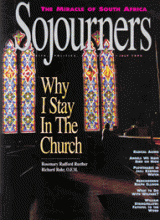Tijuana. Nogales. Matamoros. Ciudad Juárez. Nuevo Laredo. What comes to mind when you hear these names of U.S.-Mexico border towns?
For transnational corporations before and since the passage of NAFTA, the U.S.-Mexico border region represents what may be the quintessential free marketa site "free" from environmental regulations, "free" from labor laws, and "free" for the repression of anything that threatens corporate profits. The vehicle that transnationals use to capitalize on these opportunities are the "maquiladoras," export assembly factories, 2,300 strong in Mexico alone.
To an increasing number of concerned individuals and groups, however, what is happening in these border cities signifies "injustice" and issues a call for solidarity. Most who followed the NAFTA debate realize that conditions in the maquiladoras consist of hard work for low pay. But even more flagrant problems exist in a number of maquiladoras:
-12- to 15-hour work shifts for workers, who are typically young women
- physical and sexual harassment of female workers by factory supervisors and corrupt union leaders
- illegal toxic dumping by factories that pollutes ground water tables in worker neighborhoods
- refusal to translate into Spanish the English warning labels on hazardous chemicals handled in the factories
- suppression of genuine, organized labor unions.
Such abuses of basic human rights have sparked an impressive grassroots collaboration between maquiladora workers and a growing number of Canadian and U.S. solidarity groups. Organizing and raising consciousness around health, safety, and human rights has made the maquiladoras a meeting point for tri-national solidarity work, an ordered resistance to the unabated free-market enterprise.
Read the Full Article
